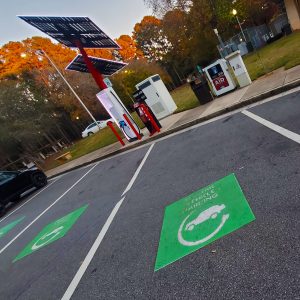Legislative Update: EV Charging Landscape

***A special thanks to the Georgia Hotel and Lodging Association (GHLA) for the following legislative update***
Due to the announcement of the forthcoming Rivian Plant and Georgians’ continued interest in electric vehicles, the Georgia General Assembly has taken interest in electric vehicle charging infrastructure. This interest in charging infrastructure touches all parts of the state and all parts of the economy, including the hotel and lodging industry. With hotels and other forms of lodging being located along all significant corridors and at all major destinations, the ability of all Georgians to travel safely and conveniently throughout the state is paramount for the industry. Before addressing the legislation in the Georgia General Assembly, it’s important to note the federal guidelines that have recently been handed down concerning federal funds for charging infrastructure.
All states will be required to submit an implementation plan by August.
These plans must include the installation of chargers every 50 miles on interstates, with the charger being within a mile of the exit. Russell McMurry, Georgia Department of Transportation (GDOT) Commissioner, explained in an appropriation committee this week that this requirement may be complex with the amount of funds being handed down, and GDOT is working on the issue.
Both HB 138 and HB 1322 seek to ensure that the state is ready to expand its charging infrastructure.
HB 138 by Chairman Cheokas (R-Americus) would allow for the resale of electricity by kilowatt for electric vehicles. The bill was drafted because more expensive electric cars charge faster, using more kilowatts per hour. As the current system is set up, an owner of a less expensive vehicle pays more money for the same amount of electricity.
HB 1322 by Representative Powell (R-Hartwell) does many things concerning electric charging infrastructure, with the most significant provisions requiring any electric light and power company to file tariffs with the Georgia Public Service Commission (PSC) for electricity rates for privately owned electric vehicle charging equipment. This will ensure the rate companies charge is under the purview of the PSC. It also prohibits the electric supplier from discriminating between charging providers.
Livable Buckhead is partnering with Clean Cities Georgia, EnviroSpark, Georgia Power, and the City of Atlanta to deliver a completed EV infrastructure for Buckhead, so that no EV user in Buckhead is more than one mile from an EV charger. Through our EVery Mile Campaign, we will work with you to provide financing and leasing options for universal chargers through Georgia Power.
Learn more about the EVery Mile Campaign.
Electric vehicles are the future of motoring. With technology developing rapidly, designs becoming more eye-catching and the world becoming more environmentally conscious, a new era of electric vehicles has been born. Companies like Audi have announced that they will no longer develop the traditional combustion engines, highlighting the brand’s commitment to lowering emissions going forward and even announcing plans to offer 20 EVs by the middle of the decade. Manufacturer’s clearly understand that the internal combustion engine’s days are numbered.
Learn more about EV’s on our EV Resource page.








